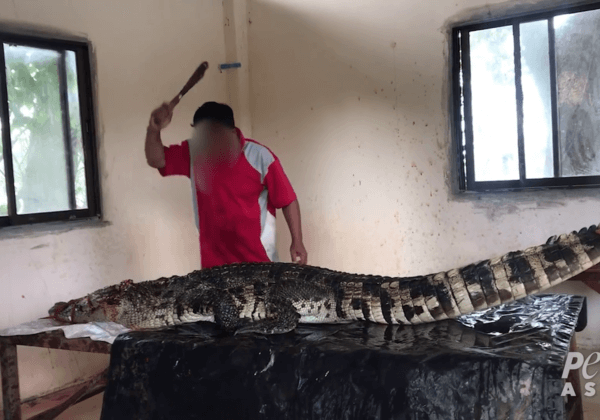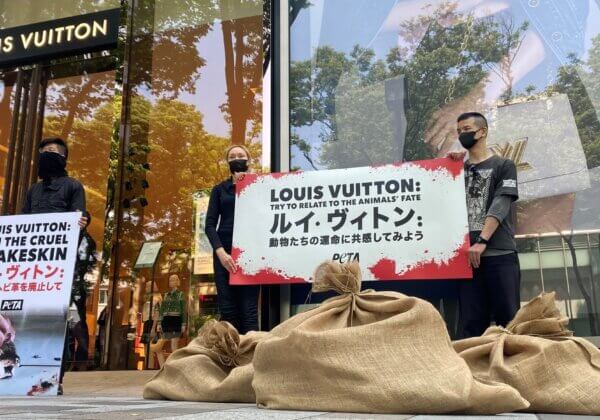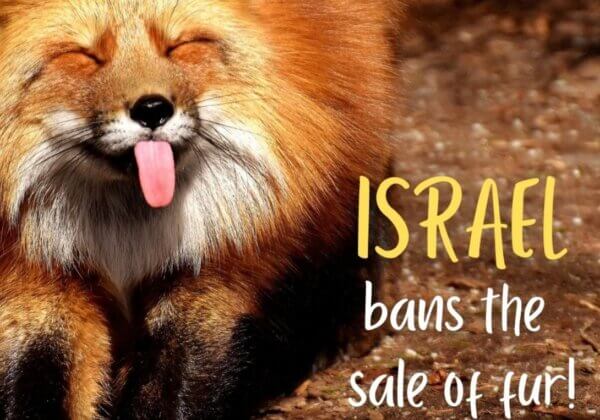PETA Has Decimated the Angora Industry. Now Let’s Win Against Mohair
No one was talking about angora.
While retailers weighed decisions about the use of fur, leather, exotic skins, and even wool following exposés from PETA and PETA U.S., angora producers were quietly shipping rabbits’ fur to clothing companies around the world.
Gentle angora rabbits, whose long, soft fur was being used for sweaters, hats, gloves, and more, were forgotten victims in the fashion industry.
That is, until PETA exposed rampant abuse on angora farms and changed everything.
Most angora comes from rabbits on Chinese factory farms, and PETA’s eyewitness footage from inside the facilities—showing angora rabbits screaming as workers tied them down and ripped out their fur—sent shock waves through the clothing industry and the marketplace.
As PETA’s video went viral, stunned retailers quickly agreed to meet with PETA affiliates. Most—including Calvin Klein, H&M, Marks & Spencer, Tommy Hilfiger, and Topshop—rapidly dropped angora wool from their clothing lines. After talking with PETA U.S., the world’s largest clothing retailer, Inditex, which owns Zara, not only banned angora wool but also worked with us to donate almost $1 million worth of its already manufactured angora garments to Syrian refugees.
If a brand hesitated, PETA supporters worldwide flooded the company with e-mails, which persuaded GUESS, BCBG, and The Kooples to make the compassionate choice. To date, more than 300 major retailers have banned angora—and the number keeps climbing.
Whenever PETA pulls back the curtain on the animal-exploiting industries that no one else is talking about, the resulting worldwide outrage brings about significant changes.
“Look at what PETA did to angora. They virtually wiped it out.”
—Top fashion industry executive
In the months following our exposé, Chinese exports of angora dropped steadily and were down 85 percent just one year after we released the footage. Those numbers stayed consistent before trade information databases stopped tracking them because of a lack of demand for angora. The success of the anti-angora campaign has effectively decimated the industry.
With angora on its way out, PETA and our international affiliates set our sights on mohair.
A PETA eyewitness visited 12 mohair farms in South Africa, where most of the world’s mohair comes from, and documented pervasive cruelty to animals at every single one. Shearers threw angora goats, cut off swaths of their skin, and cut conscious animals’ throats. Workers picked up goats by the tails, likely breaking them. One farmer dumped rams into tanks of cleaning solution and shoved their heads into the liquid, which he admitted would poison them if they swallowed it.
Workers punched holes in goats’ ears with pliers, causing the animals to scream. Another farmer said that the goats “shout and roll around” when they’re castrated without painkillers because “it’s bloody painful.”
Before The Washington Post broke the investigation, before the video hit PETA’s website and was streamed all over the world, before the farmers even knew that their cruel acts were caught on camera, the mohair industry had already taken a massive hit.
PETA affiliates had been rushing the video footage to our allies within major international retailers, encouraging them to ban mohair before the case broke. Soon, the largest clothing companies in the world—including Zara, Topshop, Gap, Banana Republic, UNIQLO, Esprit, MANGO, Old Navy, Athleta, and H&M—had agreed.
So far, more than 100 major fashion brands have banned mohair. And you can help further dismantle the abusive mohair industry just like you did with angora.
Ask retailers that are still attempting to profit from goats’ suffering to ban mohair now:









